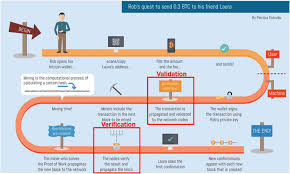Cryptomomen.com – In the face of rampant corruption plaguing West Africa, the advent of cryptocurrency, notably Bitcoin, has sparked intriguing debates. Bitcoin’s decentralized and immutable nature challenges the traditional power structures and opaque systems that facilitate corrupt practices.
As a result, it has the potential to transform the region’s economic and political landscape. This article delves into the intricate relationship between Bitcoin and corruption in West Africa, examining its potential to both exacerbate and mitigate this pervasive issue.
Continue reading to explore the multifaceted impacts of Bitcoin on the fight against corruption in the region.
Definition of corruption and its prevalence in West Africa
Corruption is the abuse of power for personal gain, leading to a decline in public trust and economic growth. West Africa has been particularly vulnerable to corruption, with devastating consequences. Citizens have suffered from poor governance, lack of transparency, and the diversion of funds intended for essential services.
Moreover, corruption has undermined financial stability by facilitating illicit flows of money and weakening institutions responsible for enforcing transparency.
To combat this, governments and international organizations are implementing initiatives such as promoting Bitcoin adoption to increase financial transparency.
Additional steps to improve the content:
- Start with a strong, concise sentence that defines corruption.
- Provide specific examples to illustrate the prevalence of corruption in West Africa.*
Emphasize the negative consequences of corruption on the region.
- Highlight the role of Bitcoin in promoting financial transparency.
- Suggest solutions to combat corruption in the region.
Thank you for visiting Cryptomomen.com
Introduction of Bitcoin and its potential to combat corruption
Bitcoin, a decentralized digital currency, has garnered significant attention for its potential to disrupt traditional financial systems. Its inherent transparency and lack of central authority present unique advantages in the fight against corruption.
Firstly, Bitcoin transactions are recorded on a publicly viewable blockchain, providing an immutable ledger that can expose illicit activities. Secondly, the absence of intermediaries reduces the potential for bribery and other forms of manipulation.
Lastly, Bitcoin empowers individuals to securely store and transfer funds without the risk of censorship or confiscation, fostering financial independence and reducing opportunities for corruption.
Understanding Bitcoin’s Features and Their Relevance to Anti-Corruption
Understanding Bitcoin’s features is crucial in the fight against corruption. Its decentralized nature and pseudonymous transactions provide financial transparency, making it difficult for corrupt officials to hide their ill-gotten gains. Unlike traditional banking systems, Bitcoin operates on a public ledger (blockchain), allowing anyone to view and verify transactions.
This feature, combined with Bitcoin’s immutable and traceable nature, provides a level of accountability that can deter corruption. Additionally, Bitcoin’s low transaction fees and global accessibility make it an attractive option for individuals and organizations looking to transfer funds securely and transparently.
Decentralization and transparency
Decentralization and transparency are key tenets of Bitcoin, ensuring financial transparency through its immutable ledger. Transactions are visible to all participants, eliminating room for manipulation or fraud.
This fosters trust in the system, as individuals can independently verify the legitimacy of transactions. Unlike traditional financial institutions, Bitcoin does not rely on centralized authorities, promoting a more equitable and inclusive financial landscape.
Immutability and audit trail
By design, Bitcoin transactions are immutable and thoroughly logged in a public ledger. This feature, coupled with the inherent transparency of the blockchain, establishes an unalterable audit trail, fostering robust financial transparency. Consequently, all transactions are perpetually verifiable, enabling the tracking and auditing of funds with unparalleled accuracy and accountability.
Case Studies of Bitcoin’s Use in Anti-Corruption Initiatives in West Africa
Bitcoin’s immutable and transparent ledger has emerged as a potential tool in the fight against corruption in West Africa. Notably, in Sierra Leone, the use of Bitcoin donations for the 2018 presidential election demonstrated the technology’s ability to reduce the risk of vote-buying.
Additionally, in Nigeria, the anti-corruption agency has explored using Bitcoin to foster financial transparency and accountability in government procurement processes.
These case studies highlight Bitcoin’s potential as a tool for promoting integrity and reducing corruption in the region.
Liberia: Utilizing Bitcoin for government transparency
In a bid to enhance government transparency and accountability, Liberia has taken a bold step by exploring the potential of Bitcoin.
This revolutionary digital currency offers a decentralized and immutable ledger system, ensuring that financial transactions are recorded securely and publicly. By embracing Bitcoin, Liberia aims to reduce corruption, increase trust in public institutions, and promote economic growth.
The implementation process is underway, with the government establishing a regulatory framework and partnering with local businesses to facilitate Bitcoin usage. The hope is that Bitcoin will empower Liberian citizens to monitor government spending, hold officials accountable, and participate in the decision-making process.
Ghana: Leveraging Bitcoin for financial inclusion and accountability
Ghana has recognized the potential of Bitcoin to empower its citizens. Through its implementation, Ghana aims to enhance financial inclusion by providing access to banking services for the unbanked population. Additionally, Bitcoin’s transparency and immutability offer a means to improve accountability and reduce corruption within the financial system. By leveraging the decentralized and secure nature of Bitcoin, Ghana seeks to foster economic growth and promote financial stability for its people.
Challenges and Limitations of Using Bitcoin for Anti-Corruption in West Africa
Despite its potential as a tool for combating corruption, the adoption of Bitcoin in West Africa faces several challenges and limitations.
Firstly, the cryptocurrency’s volatility and lack of widespread acceptance can create uncertainty and reluctance among potential users. Secondly, the technical complexity of Bitcoin can pose a barrier to entry for those unfamiliar with cryptocurrency.
Additionally, the anonymity associated with Bitcoin transactions can be attractive to corrupt individuals seeking to launder illicit funds. Furthermore, the lack of regulatory frameworks and financial transparency in some West African countries can hinder the effective utilization of Bitcoin for anti-corruption purposes.
Overcoming these challenges will require a concerted effort from governments, financial institutions, and civil society organizations to address volatility, improve accessibility, combat money laundering, and establish clear regulatory guidelines.
Thanks for reading
In conclusion, while Bitcoin’s potential impact on corruption in West Africa is still evolving, it presents a promising avenue for promoting financial transparency and accountability. Its decentralized and immutable nature could make it more difficult for corrupt officials to hide illicit transactions. Moreover, its use as a store of value could provide an alternative to traditional financial institutions that may be susceptible to corruption.
As Bitcoin adoption continues to grow in the region, it will be crucial to monitor its effects on corruption and to implement mechanisms to mitigate any potential risks. By leveraging the innovative power of Bitcoin, West Africa can take significant strides towards combating corruption and building a more transparent and equitable financial system.
Thank you for reading another insightful article. Don’t forget to share this with your friends and colleagues who may find it valuable. Your feedback and engagement are greatly appreciated.



